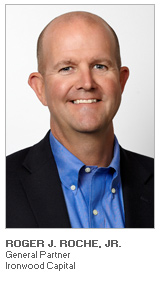
In April of this year, ABL Advisor presented the second of its annual sales managers’ roundtable discussion aimed at understanding the inherent dynamics between lenders and borrowers in the current lending environment. Understandably, the private equity sponsor community factored heavily in our conversations with Gail Bernstein, Bruce Sprenger, Michael Sheff and Joe Powers. As such, we thought it would be interesting to gain the perspective from the other side of the table, so to speak.
We were delighted when Roger Roche, senior managing director at Ironwood Capital, agreed to speak with us to share his views on the current marketplace as it relates to senior lenders, private equity sponsors and mezzanine lenders. Roche, who began his banking career at BankBoston in 1987, has seen a lot in the last 27 years. From auditor to senior lender, Roche founded SwingBridge Capital, a private equity and financial services firm in 1999. Shortly thereafter, he joined former investors Marc Reich and Carolyn Galiette at Ironwood.
Avon, CT-based Ironwood Capital is a provider of capital to middle-market companies in a broad range of industries. The firm is not a control investor. Instead, Ironwood pursues a strategy that provides the opportunity for its management teams to maintain maximum equity ownership.
In the conversation that follows, Roche speaks frankly about the realities and the sometimes complex situations both equity sponsors and mezzanine lenders encounter when partnering with senior lenders.
ABL Advisor: Roger, from your perspective and observations, what do private equity sponsors value the most in their senior lender relationships? These days, is it surety of close, the lender delivering on what they have proposed or something else?

Roger Roche: I’ve been in this business awhile and learned that it really depends on the economic cycle you’re in. In certain cycles – in 1998, 2001 through 2002 and 2008 through 2009 – the asset-based lender was the go-to guy because the cash-flow lenders were scared of the direction the economy was taking. But the asset-based lenders remained active by cleaning up their balance sheets a bit and pulling back on real estate lending. They could get where they needed to be on collateral by securing receivables and inventory, as well as some of the plant and equipment.
I would say that from 2007 until the end of 2010, surety of close and certainty as to what a lender was going to provide in terms of capital was really important. As the credit markets loosened up and the economy started to get better, the private equity sponsors started to go for pricing and structuring. In good times, the sponsors will go for pricing and in bad times, they go for surety of close. What we’re seeing today is asset-based lenders are really competing hard with the business development companies (BDC) and other aggressive cash-flow lenders. There are always some companies and sponsors that look beyond the closing to the long term relationship, but many focus more on the closing which is often a mistake.
There’s an ironic twist to all of this … I’m finding that the asset-based lenders are reaching out to the mezzanine community with a unitranche kind of approach. The cost of capital for the unitranche lenders is higher right now than a blended interest rate coming from a fairly aggressive asset-based lender and mezzanine group. We recently signed a term sheet and were able to bring in a bank that utilizes a quasi-ABL structure. We beat out a smaller straight BDC … I think the model works.
As for right now, I think it boils down to whose money is the greenest and who’s requiring the fewest covenants … the equity sponsors are going with the cheapest lender who offers the best deal. And for now, they don’t view the asset-based lenders any differently from the cash-flow lenders with regard to surety of close.
ABL Advisor: Can you address this from the mezzanine lenders point of view?
Roche: There are pros and cons to having a senior lender fully secured by collateral. At the end of the day, even though we have a second lien, it is fully subordinated to that of the senior lender’s position. If the senior lender feels the company isn’t going in the right direction, they control the cash in most cases and may wind up paying down their line. As mezzanine lenders, we’re lending more on an enterprise value and as a result, we are concerned with maintaining cash flow in the business. An ABL lender that is fully secured is less likely to remain patient in those circumstances. As a result we prefer working with an ABL lender that either we know and have had good experiences with or with an ABL lender that provides a portion of its capital on a cash-flow basis so that our interests are better aligned.
These days, we do have ABLs calling us up and asking us to help them get deals done. Going in, we find the asset-based lenders are friendly. But there is always the risk that they will be less so going out.
ABL Advisor: In your estimation, what separates a good lending relationship for a private equity sponsor from a great one?
Roche: Personally, I believe that for private equity firms, a really great lender doesn’t nickel and dime the sponsor for things like modifications to the borrowing base or when the portfolio company has a quarter with a hiccup. And what I mean by that is getting hit for fees or seeing an immediate increase in the interest rate. Granted, private equity sponsors may not be the most loyal folks out there. But once a firm has a portfolio company that experiences a bit of trouble or has a misstep, I believe they remember the lender that treats them fairly versus the lender who uses it as an opportunity, as I said, to nickel and dime them.
Continued on Page 2...